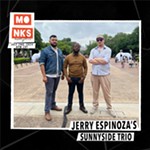Rockin' Solutions: A Four-Piece Combo
Highlights of solutions emerging from the four Live Music Task Force subcommittees
By Katherine Gregor, Fri., July 18, 2008

Helping Musicians: Tip jars to transit
As subcommittee members of the Live Music Task Force point out, every Austinite can help musicians simply by going out to hear their gigs. Pay a cover charge gladly: 80% to 100% goes directly to the band. If there's no cover, put at least $5 to $10 in the tip jar – that's likely the band's only income for a three-hour gig, which represents a six-hour work day. Some venues give bands a percentage of bar sales while they play – close out your tab before the encore to put more money in band members' pockets.
Musicians would much prefer to earn a living wage, not rely on charity. So the best help the municipality could provide is an economic stimulus package to seriously support the music industry itself, resulting in job growth, better pay, and more opportunities for truly talented, hardworking musicians to build their careers in Austin.
In the meantime, many musicians need a helping hand. The Health Alliance for Austin Musicians has neared its capacity enrollment of 1,000 musicians who lack health insurance; it currently gets no funding from the city of Austin. Some 67% of HAAM clients (who must verify musicianship) earn less than $15,000 a year; 65% are younger than 40. Under development by former state Rep. Ann Kitchen: a separate new low-cost health insurance plan that bands and other music industry professionals could use to self-ensure, starting this fall. The SIMS Foundation provides mental health services, including suicide prevention and substance abuse help.
Other needs the LMTF subcommittee has identified: new affordable housing, preservation of older central-city apartment complexes, business-side coaching and services for bands, more low-cost studio and rehearsal spaces, even Downtown parking passes for gigs. Musicians desperately need savvy, professional career management; the city could headhunt to build this industry sector in Austin. Better mass transit citywide would help musicians with the cost of gas; in the same vein, efficient late-night transit service to entertainment districts could encourage more clubgoers.
Music Venues: Keep it affordable

"I love this club; this is my heart and soul. A lot of the owners down here take it on the chin for their bands and their patrons and everybody else. You end up selling yourself short." Heath Macintosh, proprietor of the Red Eyed Fly on Red River (and the Dirty Dog on Sixth Street), speaks for many owners of live music venues.
Macintosh said he'd like the city's help with rent control, operating costs, policing the homeless population, and cleaning up streets and alleys. He'd also appreciate an attitude adjustment by city staff who threaten to shut down his club for minor violations of ever-changing regulations. "When I have a proven track record of staying in compliance, and all my taxes are paid, and they're still not willing to be flexible and work with me – it's frustrating."
The venue subcommittee is working first on defining a live music venue, by a standard establishing a minimum number of hours that musicians play and/or an associated percentage of revenues. Once clear criteria are in place, the city could assist venues that meet them. Under discussion: reducing or waiving direct city costs such as fees, taxes, utilities. An attractive incentive package might also encourage bars and restaurants to qualify by booking more live music.
Venues also need to get serious about helping themselves, Troy Dillinger pointed out. Do more marketing, build audiences, book and promote shows that can attract diverse clientele (e.g., earlier and family-friendly), help bands draw bigger crowds so they can earn a living wage.
All the new condos Downtown have put new noise ordinance pressures on venues. Two positive models cited: mutually supportive sound-abatement partnerships between 360 Condominiums and Austin Music Hall, and Red River Flats with Mohawk and other Red River venues. But as Mayor Will Wynn's Chief of Staff Rich Bailey notes, helping clubs survive financially is job No. 1: "If you don't have venues, music, and audiences, who cares about the sound?"
Entertainment Districts: Perks and nodes

Here's the big idea: Define more entertainment districts, where the city can encourage live music venues to concentrate and allow later hours (and perhaps louder sound). Then tailor incentive packages for districts that give live music venues helpful perks, extra city services, and a financial break.
Currently, the city has just two official entertainment districts: Sixth Street and the Warehouse District. Paul Oveisi said the LMTF subcommittee may recommend a change to one big Downtown district, possibly as a zoning overlay. (Boundaries would be Lady Bird Lake, Lamar, I-35, and a zigzag line to the north.) It would incorporate Sixth Street (13 current live music venues), the Red River District (11 venues), and the Warehouse District/West Sixth/Congress Avenue (13 venues). Downtown, less restrictive sound levels and rules and hours of operation would apply. As for the perks and incentives, suggestions include parking assistance, loading zones, added security, late-night transit, tax breaks, publicity, and marketing through hotels.
In addition, other "music nodes" around town could be defined as entertainment districts. Candidates that already have a concentration of live-music hot spots include South Congress (11 venues), South First (three venues), South Lamar (five venues), and an Eastside district (seven venues). Certain new growth nodes – e.g., the Domain – also could make the list. Rules for districts abutting neighborhoods would be crafted sensitively to address the noise and traffic concerns of residents.
Meanwhile, ROMA Austin is developing district recommendations as part of the Downtown Austin Plan. Their first phase report suggested that the city create an incentive package to encourage live music venues to repopulate Sixth Street. Why? Its historic buildings offer unique character and appeal; the historic area also enjoys special protection from demolition and redevelopment. If the constellation of emerging music clubs along Red River is displaced by redevelopment after the Waller Creek tunnel is completed, those clubs could be assisted in relocating back to Sixth Street. But ROMA's upcoming Waller Creek Master Plan also will incorporate spaces for (soundproofed) live music venues along the creek.
Sound Issues: Stop the noise!

Same as it ever was: Eddie Wilson (whose own ears are shot) said at a recent task force meeting: "I've been fighting loud music since I started the Armadillo. I always tell them, if you want to hear the lyrics, turn it down!"
A small number of Austin residents report they're being assaulted daily – driven crazy in their own homes – by the music blasted by inconsiderate bad actors. The LMTF subcommittee has determined that virtually all the serious problems are coming from venues: 1) in residential neighborhoods, 2) with music on outdoor patios, and 3) that fail to employ professional sound engineers. The "all of the above" venues generate the repeated complaints. The worst offenders have outdoor sound stages right next to homes; for example, neighbors at a recent public meeting complained of Botticelli's on South Congress and Freddie's Place on South First.
One much discussed solution is city subsidies to help with the high costs of venue (or home) soundproofing. Potentially, adding insulation and barriers could deliver a win-win by reducing both energy consumption and noise. Another likely recommendation is crafting distinct sound rules to suit three categories of venues: 1) temporary permits, 2) neighborhood areas, and 3) entertainment districts. Venue owners issued citations report that police officers often don't know how to read their decibel meters; they'd like one well-trained officer dedicated to help them, not just bust them.
An unintended consequence of the smoking ban inside clubs and restaurants has been the proliferation of outdoor patios with live music. These overwhelmingly are the source of noise complaints. One solution forwarded: Allow acoustic instruments only (perhaps with minimal amplification) on small outdoor patios next to homes.
A previous run last year at revising the city noise ordinance further polarized neighborhood vs. club conflicts and frayed tempers. After the Music Commission and the Planning Commission delivered conflicting recommendations, council members moved to create the LMTF.
Got something to say on the subject? Send a letter to the editor.








